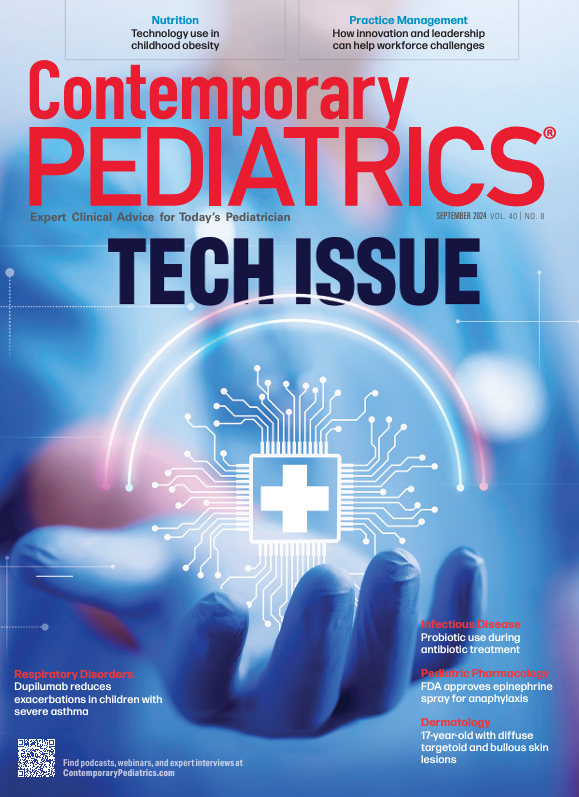Dupilumab reduces exacerbations among children with severe asthma up to 2 years
These data highlighted new findings on the experiences of children aged 6 to 11 with uncontrolled type 2 asthma treated with dupilumab.
Dupilumab reduces exacerbations among children with severe asthma up to 2 years | Image Credit: © lordn- © lordn - stock.adobe.com.

Dupilumab treatment of children aged 6–11 years who have uncontrolled moderate-to-severe type 2 asthma led to diminished rates of exacerbation and lung function improvements for up to 2 years, according to recent findings.1
These conclusions were the result of new research conducted to assess the effectiveness and the safety of add-on dupilumab at an every 2 week dose of 200 mg. This was the largest dose cohort within both the VOYAGE and EXCURSION studies for children.
This study was led by Wanda Phipatanakul, MD, from the division of immunology at Boston Children's Hospital in Massachusetts. Phipatanakul and colleagues noted that there is prior evidence of dupilumab reducing childrens’ rates of severe exacerbations and improved lung function at 100 and 200 mg dupilumab doses, but not up to 2 years.2
“Given that dupilumab 200 mg is the only dose that can be prescribed to children (aged 6–11 years) in some countries, this post hoc analysis assesses dupilumab efficacy and safety in the cohort of children who received dupilumab 200 mg q2w up to 2 years throughout VOYAGE and EXCURSION,” Phipatanakul and colleagues wrote.1
Study Design
The investigators enrolled 408 children in the 6-11 year age range in the VOYAGE study, designed as a phase 3, randomized, double-blind trial lasting 52 weeks and including those with clinician-diagnosed uncontrolled moderate-to-severe asthma. They were divided by weight to be treated either with placebo or with dupilumab 100 mg or 200 mg every 2 weeks (for subjects ≤30 kg and for those >30 kg, respectively).
Following the VOYAGE study’s conclusion, the children involved could join the open-label, single-arm extension study known as EXCURSION. Subjects participating in EXCURSION would be given dupilumab 100/200 mg therapy every 2 weeks or 300 mg every 4 weeks for an additional 52 weeks, the division of which the investigators based on subjects’ body weight at baseline.
The children who had been treated with dupilumab 200 mg on the every-2-week dosing regimen formed the largest cohort in both of the evaluated studies. The research team would consequently be able to assess the medication’s long-term safety and effectiveness.
The team’s analysis covered the annualized rate of reported severe asthma exacerbations, in addition to changes in their prebronchodilator percent predicted forced expiratory volume in a single second (ppFEV1). They also looked at treatment-emergent adverse events (AEs) in both cohorts.
Findings
In the study’s overall population, the research team concluded that dupilumab therapy had led to significantly reduced annualized exacerbation rates as well as improvement ppFEV1 among the 158 children who had been treated with the drug continuously for up to 2 years.
The team reported that there were comparable reductions in severe asthma exacerbations and ppFEV1 improvements that had been observed in the study among the 85 children initially given a placebo and then shifted to 200 mg of dupilumab every 2 weeks within the EXCURSION study.
Such positive results had also been shown by investigators to be consistent among children that were known to have type 2 asthma at the point of baseline. The investigators noted the consistency of dupilumab’s safety profile with its previously-established record of AEs.
“In summary, treatment with dupilumab 200 mg q2w led to improvements that were durable and significantly relevant in the clinical context of asthma control in children (aged 6–11 years) with uncontrolled moderate-to-severe type 2 asthma through reductions in severe exacerbations, improvements in lung function, and decline in levels of type 2 inflammatory biomarkers,” they wrote.
This article was initally published by our sister publication, HCPLive®.
References
- Phipatanakul W, Vogelberg C, Bacharier LB, et al. Dupilumab 200 mg was efficacious in children (6–11 years) with moderate-to-severe asthma for up to 2 years: EXCURSION open-label extension study. Pediatr Pulmonol. 2024; 1-8. doi:10.1002/ppul.27167.
- Bacharier LB, Maspero JF, Katelaris CH, et al. Assessment of long-term safety and efficacy of dupilumab in children with asthma (LIBERTY ASTHMA EXCURSION): an open-label extension study. Lancet Respir Med. 2023; 12(1): 45-54.

The Role of the Healthcare Provider Community in Increasing Public Awareness of RSV in All Infants
April 2nd 2022Scott Kober sits down with Dr. Joseph Domachowske, Professor of Pediatrics, Professor of Microbiology and Immunology, and Director of the Global Maternal-Child and Pediatric Health Program at the SUNY Upstate Medical University.